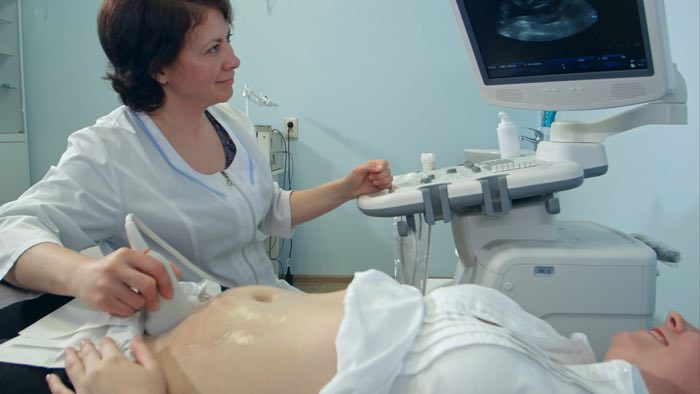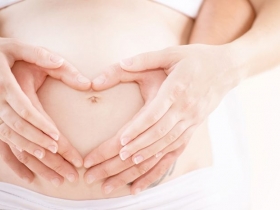Pregnancy week by week: 10 weeks
In the first trimester, during the tenth week of pregnancy, the unborn baby is about three centimetres long and weighs less than five grams. It is slowly beginning to look like a human being, and at this stage gynaecologists no longer speak of it as an embryo, but as a foetus. During this period, the internal organs grow, which are gradually beginning to function. Ongoing hormonal changes benefit foetal development, while many pregnant women in the first trimester suffer from nausea and mood swings. What awaits expectant mothers in the tenth week of pregnancy?
Development of the baby in the tenth week of pregnancy
By the tenth week of pregnancy, the foetus already has the characteristics of a real person. Hands and feet are visible, and fingernails that are no longer separated by membranes begin to grow. The baby can move their limbs freely and touch each other, even though the pregnant woman does not yet feel any movement from the baby herself. The head makes up less than half the size of the foetus. The forehead is visibly convex and protruding. The first very fine hairs are also beginning to appear. The skin is transparent and through it is possible to see the spine and how the spinal nerves separate from the spinal cord.

Examination in the tenth week of pregnancy
By this time, the woman should have had a first - trimester screening, and if she has not, she should see a doctor immediately. An examination in the first trimester of pregnancy can reveal any number of problems or warning signs. These can be easily detected from blood and urine samples. In addition, the screening also includes measuring blood pressure, determining the weight, supplementing the family history and also talking to the doctor about the feelings of the expectant mother. An integral part is a gynaecological examination, which can determine the maturity of the cervix (cervix score) and the growth of the uterus. There is also an ultrasound examination, on which you can clearly hear the heartbeat of the foetus.
Expectant mother and physical changes
In the tenth week of pregnancy, her condition is not yet visible, although she herself is already experiencing certain changes. During this period, it is common for expectant mothers to gain about one to two kilograms and some pieces in their wardrobe begin to be tight. The woman's breasts are enlarged and her uterus has roughly doubled in size. Some women also feel short of breath during this period. This puts more strain on the heart, which must get more blood into the circulatory system.
It is this period that is most typical of the symptoms, which are collectively nicknamed pregnancy nausea. The problems are usually associated with heartburn, bloating, indigestion, feelings of fatigue, swollen legs, haemorrhoids, varicose veins and other problems. Women tend to be more moody, irritable or cry due to hormonal fluctuations. In most pregnant women, these symptoms disappear during the second trimester. Difficulties can also be significantly alleviated by a healthy lifestyle, a balanced diet, rest and appropriate physical activity. Exercises to strengthen the abdominal muscles, pelvic floor and spine are especially recommended. Natural movement, such as walks or exercises for pregnant women, is very beneficial. In case of major problems with swollen legs or varicose veins, it is advisable to wear compression stockings.
Problems and risks in the tenth week of pregnancy
Spotting may occur during the first trimester, but this does not need to be an immediate cause for panic. In the tenth week of pregnancy, the blood perfusion of the uterine lining increases so spotting is relatively common. It can also occur after sexual intercourse, when the perfused mucosa is more prone to injury. But if a woman enjoys sex, the spotting is only mild and does not last long, there is no need to deny intimate moments with your partner. Conversely, if spotting does not stop or even bright red blood appears, it is necessary to consult a doctor immediately. The same applies to situations where spotting is accompanied by nausea or abdominal pain.
The period from conception to about thirteen weeks of pregnancy is the most important for the development of the child and at the same time there is the greatest risk of miscarriage. Immediately after confirmation of pregnancy, the woman should stop consuming alcohol, smoking and avoid any addictive substances. If the expectant mother regularly took any medication before pregnancy, it is necessary to discuss this with a doctor and possibly find another solution. It is recommended that women do not consume raw or uncooked meat, blue cheese, and unpasteurised dairy products in the first trimester. These are foods that can cause an infection of the digestive system, which means an increased risk to the foetus.
Conversely, when it comes to exercise and sport, during the first trimester, women do not have to be significantly restricted unless they have a high-risk pregnancy or other difficulties. If a woman has been exercising regularly before pregnancy, it is not necessary to stop physical activity immediately. It is more a matter of adapting your condition to the level of exercise and the load. The ideal form is, for example, yoga for pregnant women, Pilates or swimming. Pregnant women who have not exercised before should not start with a lot of physical activity and rather bet on natural movement options. As far as their cultural and social life or hobbies are concerned, there are no restrictions in this regard, as long as they do not endanger the foetus.
This article is translated from Czech original to English language by Bobby Pacewicz.





